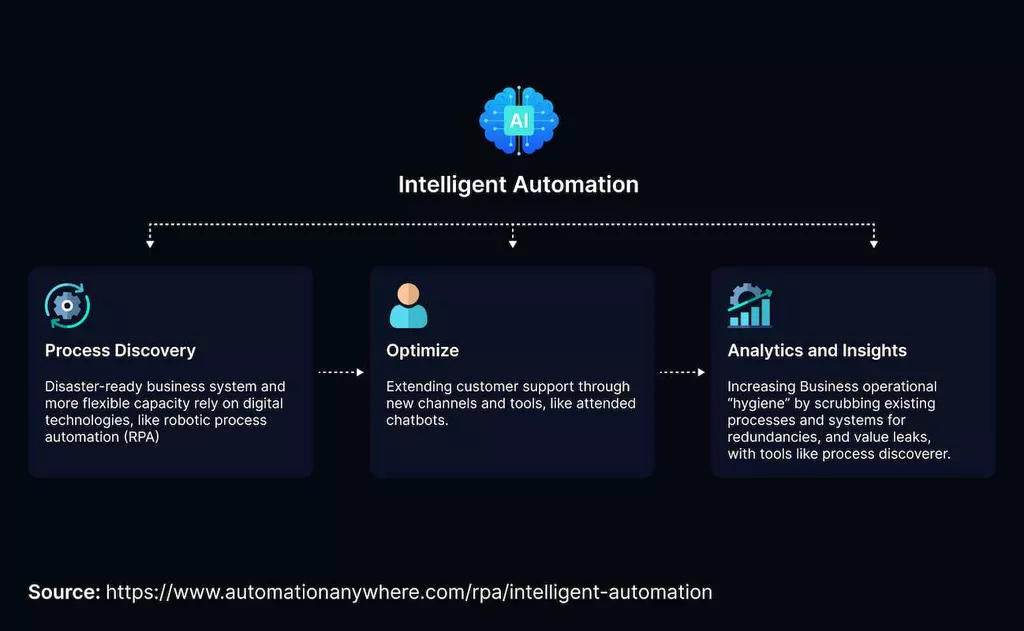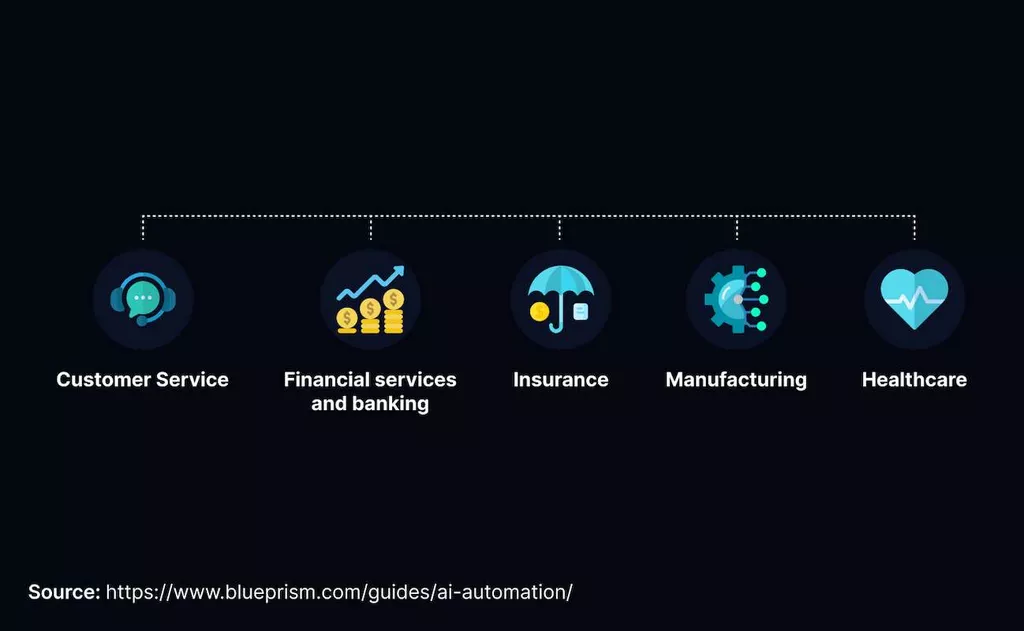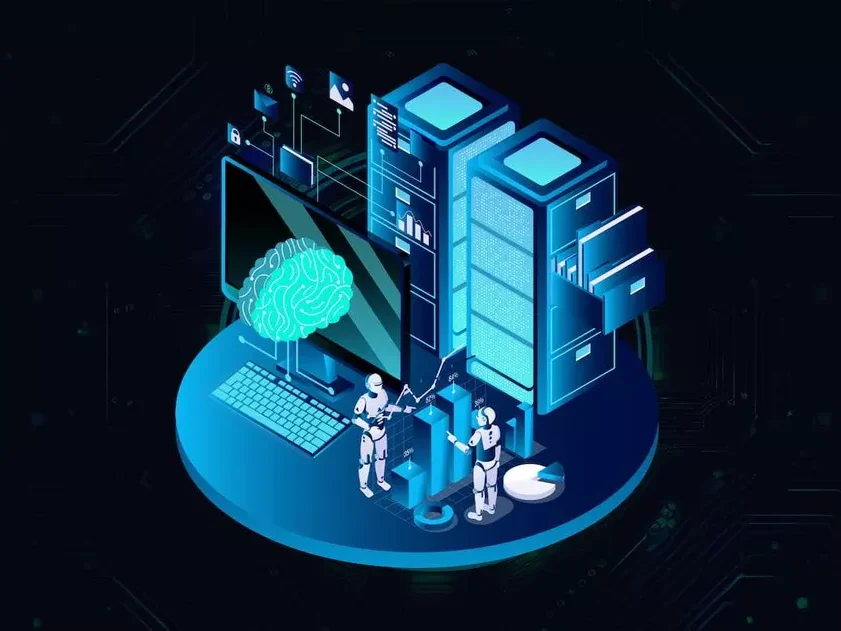In a rapidly evolving business environment, adding artificial intelligence (AI) tools to workflow is a necessity. The evolution of AI and automation leads to profound changes in all industries, radically changing how businesses operate. Here are some statistics in 2023: 48% of firms utilized intelligent automation for data analysis, and another 20% implemented it to provide invoicing, advertising, and other business procedures. This blog post will discuss AI business automation in more detail and how it will impact enterprises in 2024.
Definition of Intelligent Automation (IA) and Its Main Elements

Automation is any technology that decreases human labor, especially in predictable or routine tasks. It can be as simple as conveyor belts or as sophisticated as Google Translate. In 2024, IA will be very popular, which includes three leading technologies:
- The main component of the procedure is AI. With machine learning (ML) and sophisticated systems to analyze both structured and unstructured datasets, enterprises may build a knowledge base and create forecasts based on such information.
- The second part of an intelligent system is business process automation (BPA) to ensure maximum flexibility and consistency in work procedures. BPA is used in most areas to streamline operations and improve collaboration.
- The third element is robotic process automation (RPA), which utilizes robots or bots to perform back-office tasks, including extracting information or filling out documents. Such bots are an excellent complement to artificial intelligence, as RPA utilizes the potential of AI to perform more complex work and different application methods.
The combination of these elements creates a transformative structure that streamlines workflows and positively impacts the client experience.
How Will Automation Change Business Processes in 2024?
Today, the adoption of artificial intelligence for business continues to rise. This leads to the consistent emergence of innovative solutions within the industry. Let’s look at how AI can improve various categories of business procedures through AI:
- Predictive Analysis: All AI-ruled solutions utilize ML to analyze information, determine the system’s characteristics, find the best solutions, and optimize activities. When AI analyzes the entire flow of data from different sources, it can detect patterns and potential complications before they arise. If you own an online store, AI may help you define suspicious consumer activity online. It then segments buyers based on their behavior to make advertising campaigns more effective.
- Automation of Redundant Activities: Performing repetitive procedures is time-consuming, even if it does not produce direct results. Instead of expanding your staff to handle straightforward tasks, RPA can do everything faster and more efficiently through automation. ML and AI solutions allow you to scale business processes by performing redundant jobs without recruiting additional employees.
- Optimal Customer Experience: Many enterprises utilize AI-backed solutions to reduce expenditures, but its potential in 2024 is much greater. It can also have a positive impact on customer experience. AI-backed business process management systems study datasets to obtain precise client information and discover future trends. The role of chatbots is increasing every year as they help people get answers to questions through AI business automation.
- Capital Savings: If an enterprise adds AI to its operations, it ensures all accessible resources are utilized. Classic business process management is more expensive and takes more time since it involves the collaboration of specialists to analyze datasets and find options to provide business development. The AI adoption allows you to search for troubles, find optimal solutions, and add them to your work without spending extra money.
Making rational decisions is impossible without in-depth research and analysis. However, it takes a lot of effort to sort through information and find quality data to make effective decisions. AI-backed structures are indispensable in this sector. Using the latest ML algorithms and neural networks, entrepreneurs can make decisions to provide business prosperity.
Examples of Utilizing AI Automation in Different Industries in 2024

Major corporations, including Google, Amazon, Microsoft, and Apple, are spending billions annually on AI and automation, universities are introducing advanced solutions into their accounting programs, and the US Department of Defense is increasing its efforts in artificial intelligence. Let’s analyze how AI automation is changing different industries:
- HR and Recruiting: AI has significantly changed HR and recruiting, simplifying the finding of candidates and automating routine processes. Intelligence solutions use data analysis to scan resumes, search for optimal vacancies, and look for patterns in information from specialists.
- Working with Supply Chains: AI-backed analytics predicts market conditions, optimizes logistics, and reduces downtime. By implementing artificial intelligence in BPA, firms can calculate inventory requirements and optimize the supplier selection procedure.
- Banking: financial institutions use AI automation in various jobs, including fraud, risk management, and customer service. AI studies transaction patterns to look for suspicious activity. It also tailors banking services for different categories of users.
- Insurance: intelligent process automation in insurance improves claims processing and risk identification. By automating paperwork and information retrieval, insurers can resolve claims faster, improve client interactions, and decrease the risk of mistakes.
- Industrial: In the industrial sector, AI enables predictive maintenance and raises operational efficiency. By analyzing information from equipment, AI-backed solutions try to find potential faults and perform preventative maintenance to avoid costly repairs and downtime.
AI is not a futuristic concept from the future but a modern solution that is actively changing how enterprises work, providing increased productivity and customer satisfaction. The variety of artificial intelligence applications makes it a versatile and influential solution in the business environment.
Difficulties with Implementing AI Automation Tools
Artificial intelligence and automation have many advantages, but before you integrate such technologies into your workflow, you need to look at their main disadvantages, which are still limiting digital transformation in 2024:
- Information Confidentiality Issues: AI-backed systems require access to sensitive business data and customer information, but adding third-party systems may compromise the confidentiality of this information.
- Impact on the Labor Market: AI automation may transform jobs, especially those involving routine processes. It may result in some employees undergoing additional training to gain new skills.
- Transparency: Some advanced AI-ruled systems, especially those based on deep learning technology, are often a “black box,” meaning that their functioning can be challenging to interpret. Lack of transparency may create additional complexity when explaining and understanding processes is essential.
Implementing AI automation is a challenging task that requires specialized knowledge and experience. Firms may find it difficult to select the optimal model and determine the limits of AI, so we recommend seeking professional help.
How to Prepare for AI Business Process Automation in 2024?
The adoption of AI-backed solutions is undoubtedly transformative for business. To prepare for AI business process automation in 2024, organizations should consider the following key points:
- Organizational Change Plan: It is necessary to analyze the organizational changes that occur when AI is integrated. Before automation starts, it is essential to formulate and implement a project for organizational changes to ensure whether such changes work with decision-makers.
- Key Performance Indicators (KPIs): Remember, AI business process automation is not just a technique but an entire strategy. It is necessary to clearly define IA goals and parameters to assess how effectively the implementation occurs.
- Database Quality: Ensure that all information collected using AI automation tools is as pure as possible to derive accurate insights.
- Inputs and Outputs: AI can sort and distribute requests by default, but additional data may be required to refine the system’s definition. Add input information to ensure correct segmentation and grouping.
Chris Dimitriadis, director of digital strategy at ISACA, an international IT governance association, reports that only 7% of enterprises train their employees in the basics of working with AI. He emphasizes that if staff are not ready to utilize AI-backed structures, such investments will not pay off.
Final Words
AI business automation systems, with the potential of AI, offer unprecedented capabilities and results. The progress of AI-backed tools over the past few years indicates that they will continue to play a significant role in enhancing efficiency and performance quality. Millions of firms globally are integrating AI systems to automate their business processes, and this trend is expected to grow.
Overall, automation is the future of BPA and is already available to enterprises of all sizes today. The sooner MetaDialog AI is incorporated into your operations, the faster you can scale your enterprise and improve your market position. Consider booking a demo to assess which intelligence systems suit your situation.
